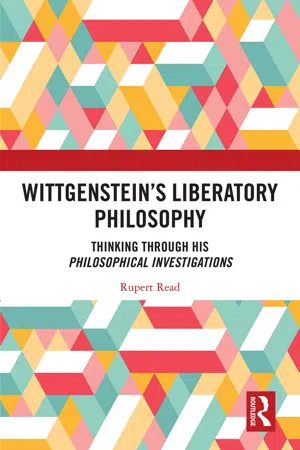
Wittgenstein's Liberatory Philosophy
Thinking Through His Philosophical Investigations
- 386 pages
- English
- ePUB (mobile friendly)
- Available on iOS & Android
About This Book
In this book, Rupert Read offers the first outline of a resolute reading, following the highly influential New Wittgenstein 'school', of the Philosophical Investigations. He argues that the key to understanding Wittgenstein's later philosophy is to understand its liberatory purport.
Read contends that a resolute reading coincides in its fundaments with what, building on ideas in the later Gordon Baker, he calls a liberatory reading. Liberatory philosophy is philosophy that can liberate the user from compulsive (and destructive) patterns of thought, freeing one for possibilities that were previously obscured. Such liberation is our prime goal in philosophy. This book consists in a sequential reading, along these lines, of what Read considers the most important and controversial passages in the Philosophical Investigations: 1, 16, 43, 95 & 116 & 122, 130–3, 149–151, 186, 198–201, 217, and 284–6. Read claims that this liberatory conception is simultaneously an ethical conception. The PI should be considered a work of ethics in that its central concern becomes our relation with others. Wittgensteinian liberations challenge widespread assumptions about how we allegedly are independent of and separate from others.
Wittgenstein's Liberatory Philosophy will be of interest to scholars and advanced students working on Wittgenstein, and to scholars of the political philosophy of liberation and the ethics of relation.
Frequently asked questions
Information
1 The Philosopher and Temptation
Wittgenstein’s Augustinian Opening Move
The inclination, the running up against something indicates something: St. Augustine knew that already when he said: “What, you swine, you want not to talk nonsense! Go ahead and talk nonsense, it does not matter!
Don’t for heaven’s sake be afraid of talking nonsense! But you must pay attention to your nonsense.
1.1 Augustine throughout the PI
We feel as if we had to penetrate phenomena: our investigation, however, is directed not towards phenomena, but, as one might say, towards the ‘possibilities’ of phenomena. We remind ourselves, that is to say, of the kind of statement that we make about phenomena. Thus Augustine recalls to mind the different statements that are made about the duration, past present or future, of events. (These are, of course, not philosophical statements about time, the past, the present and the future.)
Our investigation is therefore a grammatical one. Such an investigation sheds light on our problem by clearing misunderstandings away. Misunderstandings concerning the use of words, caused, among other things, by certain analogies between the forms of expression in different regions of language.
…it is easy to get into that dead-end in philosophy, where one believes that the difficulty of the task consists in our having to describe phenomena that are hard to get hold of, the present experience that slips quickly by… Where we find ordinary language too crude, and it looks as if we were having to do, not with the phenomena of every-day, but with ones that “easily elude us, and, in their coming to be and passing away, produce those others as an average effect.”
“Time” and “times” are words forever on our lips. “How long did we speak?”, we ask. “How long did he take to do that?” “How long is it since I have seen it!” “This syllable is twice the length of that”. We use these words and hear others using them. They understand what we mean and we understand them. No words could be plainer or more commonly used. Yet their true meaning is concealed from us. We have still to find it out.11
Perhaps this whole difficulty stems from taking the time concept from time in physics and applying it to the course of immediate experience. It's a confusion of the time of the film strip with the time of the picture it projects. For ‘time’ has one meaning when we regard memory as the source of time, and another when we regard it as a picture preserved from a past event. If we take memory as a picture, then it's a picture of a physical event. The picture fades, and I notice how it has faded when I compare it with other evidence of what happened. In this case, memory is not the source of time, but a more or less reliable custodian of what ‘actually’ happened; and this is something we can know about in other ways, a physical event.—It's quite different if we now take memory to be the source of time. Here it isn't a picture, and cannot fade either—not in the sense in which a picture fades, becoming an ever less faithful representation of its object. Both ways of talking are in order, and are equally legitimate, but cannot ...
Table of contents
- Cover
- Half Title
- Title Page
- Copyright Page
- Dedication
- Table of Contents
- Preface and Acknowledgements
- 0 Introduction: Thinking through Wittgenstein
- 1 The Philosopher and Temptation: Wittgenstein’s Augustinian Opening Move
- 2 “It Is as You Please”: PI 16 as an Icon of Wittgenstein’s Philosophy of Freedom
- 3 What Is (Wittgenstein’s Own Account of) Meaning?: PI 43 and Its Critics
- 4 When Wittgenstein Speaks of ‘Everyday’ Language, He Means Simply Language: A Liberatory Reading of PI 95–124
- 5 Objects of Comparison to the Real (Philosophical?) Discovery: PI 130–133
- 6 Wittgenstein Dissolves the Know-How vs Knowledge-that Debate: PI 149–151
- 7 Logical Existentialism?: An Approach to PI 186
- 8 The Faux-Freedom of Nonsense: Kripke’s Wittgenstein and Wittgenstein’s Wittgenstein at PI 198–201
- 9 Overcoming Over-Reliance on ‘The Bedrock’?: On PI 217
- 10 The Anti-‘Private-Language’ Considerations as a Fraternal and Freeing Ethic: Towards a Re-Reading of PI 284–309
- 11 Conclusion: (A) Liberating Philosophy
- Bibliography
- Index